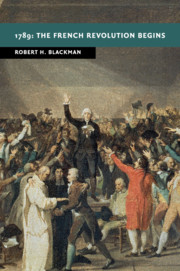Refine search
Actions for selected content:
8 results
11 - The French Revolution
- from Part III - Revolutionary Convergences
-
- Book:
- Democracy's Double Helix
- Published online:
- 09 September 2025
- Print publication:
- 14 August 2025, pp 241-287
-
- Chapter
- Export citation
1 - “It Is Glory to Have Broken Such Infamous Orders”
-
- Book:
- Rogue Diplomats
- Published online:
- 24 April 2020
- Print publication:
- 21 May 2020, pp 24-77
-
- Chapter
-
- You have access
- HTML
- Export citation
Chapter 2 - The Estates General Sitting as a National Assembly
-
- Book:
- 1789: The French Revolution Begins
- Published online:
- 29 July 2019
- Print publication:
- 01 August 2019, pp 72-114
-
- Chapter
- Export citation
Chapter 4 - The King Resists
-
- Book:
- 1789: The French Revolution Begins
- Published online:
- 29 July 2019
- Print publication:
- 01 August 2019, pp 144-179
-
- Chapter
- Export citation
Chapter 5 - Toward a Defensive Constitution
-
- Book:
- 1789: The French Revolution Begins
- Published online:
- 29 July 2019
- Print publication:
- 01 August 2019, pp 180-217
-
- Chapter
- Export citation
Conclusion
-
- Book:
- 1789: The French Revolution Begins
- Published online:
- 29 July 2019
- Print publication:
- 01 August 2019, pp 256-268
-
- Chapter
- Export citation
Chapter 3 - The King Responds
-
- Book:
- 1789: The French Revolution Begins
- Published online:
- 29 July 2019
- Print publication:
- 01 August 2019, pp 115-143
-
- Chapter
- Export citation

1789: The French Revolution Begins
-
- Published online:
- 29 July 2019
- Print publication:
- 01 August 2019
